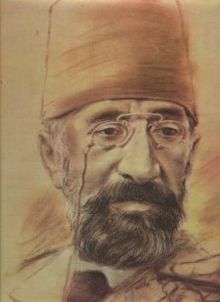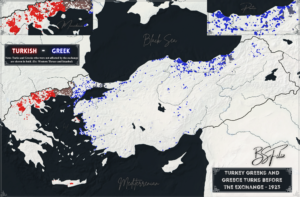Greek and Turkish Population Before the Exchange. Note: Turks and Greeks who were not affected by the exchange are shown in bold. (Ex: Western Thrace and Istanbul)
by Mother: 23
by Father: 7
(From Wikipedia)
- Ahmed I – (1590–1617), Ottoman sultan, Greek mother Handan Sultan (originally named Helena (Eleni) – wife of Ottoman Sultan Mehmed III
- Ahmed III – (1673–1736), Ottoman sultan, Greek mother (Emetullah Rabia Gülnûş Sultan), originally named Evemia, who was the daughter of a Greek Cretan priest
- Bayezid I – (1354–1403), Ottoman sultan, Greek mother (Gulcicek Hatun or Gülçiçek Hatun) wife of Murad I
- Bayezid II – (1447–1512), Ottoman sultan, Greek mother (Amina Gul-Bahar or Gulbahār Khātun, tr:I. Gülbahar Hatun), a Greek Orthodox woman of noble birth from the village of Douvera, Trabzon
- Hasan Pasha (son of Barbarossa) (c. 1517-1572) was the son of Hayreddin Barbarossa and three-times Beylerbey of Algiers, Algeria. His mother was a Morisco. He succeeded his father as ruler of Algiers, and replaced Barbarossa’s deputy Hasan Agha who had been effectively holding the position of ruler of Algiers since 1533.
- Hayreddin Barbarossa, (c. 1478–1546), privateer and Ottoman admiral, Greek mother, Katerina from Mytilene on the island of Lesbos, (however most probably also his father had been a Greek Muslim convert)
- Ibrahim I, (1615–1648), Ottoman sultan, Greek mother (Mahpeyker Kösem Sultan), the daughter of a priest from the island of Tinos; her maiden name was Anastasia and was one of the most powerful women in Ottoman history
- Mahmoud Sami el-Baroudi, (1839–1904) was Prime Minister of Egypt from 4 February 1882 until 26 May 1882 and a prominent poet. He was known as rab alseif wel qalam رب السيف و القلم (“lord of sword and pen”). His father belonged to an Ottoman-Egyptian family while his mother was a Greek woman who converted to Islam upon marrying his father.
- Muhammad al-Mahdi (الإمام محمد بن الحسن المهدى) also known as Hujjat ibn al-Hasan, final Imām of the Twelve ImamsShi’a, Greek mother, Her Greatness Narjis (Melika), was a Byzantine princess who pretended to be a slave so that she might travel from her kingdom to Arabia
- Murad I, (1360–1389) Ottoman sultan, Greek mother, (Nilüfer Hatun (water lily in Turkish), daughter of the Prince of Yarhisar or Byzantine Princess Helen (Nilüfer)
- Murad IV (1612–1640), Ottoman sultan, Greek mother (Valide Sultan, Kadinefendi Kösem Sultan or Mahpeyker, originally named Anastasia)
- Mustafa I – (1591–1639), Ottoman sultan, Greek mother (Valide Sultan, Handan Sultan, originally named Helena (Eleni)
- Mustafa II – (1664–1703), Ottoman sultan, Greek Cretan mother (Valide Sultan, Mah-Para Ummatullah Rabia Gül-Nush, originally named Evemia)
- Oruç Reis, (also called Barbarossa or Redbeard), privateer and Ottoman Bey (Governor) of Algiers and Beylerbey (Chief Governor) of the West Mediterranean. He was born on the island of Midilli (Lesbos), mother was Greek (Katerina)
- Selim I, Ottoman sultan, Greek mother (Gulbahar Sultan, also known by her maiden name Ayşe Hatun); his father, Bayezid II, was also half Greek through his mother’s side (Valide Sultan Amina Gul-Bahar or Gulbahar Khatun – a Greek convert to Islam) – this made Selim I three-quarters Greek
- Suleiman I (Suleiman the Magnificent), Ottoman sultan, his father Bayezid II was three-quarters Greek; (Suleiman’s mother was of Georgian origin).
- Shah Ismail I – (1487-1524) the founder of Turkic-Persian Safavid Dynasty of Iran: Ismā’il’s mother was an Aq Qoyunlu (Turkmen) noble, Martha, the daughter of Turkmen Uzun Hasan by his Pontic Greek wife Theodora Megale Komnene, better known as Despina Hatun. Theodora was the daughter of Emperor John IV of Trebizond whom Uzun Hassan married in a deal to protect Trebizond from the Ottomans.
- Kaykaus II, Seljuq Sultan. His mother was the daughter of a Greek priest; and it was the Greeks of Nicaea from whom he consistently sought aid throughout his life.
- Ibn al-Rumi – Arab poet was the son of a Persian mother and a Byzantine freedman father and convert to Islam.
- Sheikh Bedreddin – (1359–1420) Revolutionary theologian, Greek mother named “Melek Hatun”.
Then:
- Hussein Hilmi Pasha – (1855–1922), Ottoman statesman born on Lesbos to a family of Greek ancestry who had formerly converted to Islam. He became twice Grand vizier of the Ottoman Empire in the wake of the Second Constitutional Era and was also Co-founder and Head of the Turkish Red Crescent. Hüseyin Hilmi was one of the most successful Ottoman administrators in the Balkansof the early 20th century becoming Ottoman Inspector-General of Macedonia from 1902 to 1908, Ottoman Minister for the Interior from 1908 to 1909 and Ottoman Ambassador at Vienna from 1912 to 1918.
- Ahmet Vefik Paşa (Istanbul, 3 July 1823 – 2 April 1891), was a famous Ottoman of Greek descent (whose ancestors had converted to Islam). He was a statesman, diplomat, playwright and translator of the Tanzimat period. He was commissioned with top-rank governmental duties, including presiding over the first Turkish parliament. He also became a grand vizier for two brief periods. Vefik also established the first Ottoman theatre and initiated the first Western style theatre plays in Bursa and translated Molière‘s major works.
- Ahmed Resmî Efendi (English, “Ahmed Efendi of Resmo”) (1700 – 1783) also called Ahmed bin İbrahim Giridî (“Ahmed the son of İbrahim the Cretan”) was a Grecophone Ottoman statesman, diplomat and historian, who was born into a Muslim family of Greek descent in the Cretan town of Rethymno. In international relations terms, his most important – and unfortunate – task was to act as the chief of the Ottoman delegation during the negotiations and the signature of the Treaty of Küçük Kaynarca. In the literary domain, he is remembered for various works among which his sefâretnâme recounting his embassies in Berlin and Vienna occupy a prominent place. He was Turkey’s first ever ambassador in Berlin.
- Ibrahim Edhem Pasha (1819–1893) was an Ottoman statesman, who held the office of Grand Vizier in the beginning of Abdul Hamid II‘s reign between 5 February 1877 and 11 January 1878. He served numerous administrative positions in the Ottoman Empireincluding minister of foreign affairs in 1856, then ambassador to Berlin in 1876, and to Vienna from 1879 to 1882. He also served as Army Engineer and minister of interior from 1883 to 1885. In 1876-1877, he represented the Ottoman Government at the Constantinople Conference. He was born in Chios of Greek ancestry, in a Christian Greek Orthodox village on the island of Chios. Strangely, his connection to Chios is not well-documented: his son Osman Hamdi Bey claimed that he was a member of the Skaramanga family, but Edhem Pasha himself tried to efface his Greek connections. As a young boy in 1822, he was orphaned and captured by Ottoman soldiers during the massacre of the Greek population of Chios. He was sold into slavery, brought to Constantinople, and adopted by the (later) grand vizier Hüsrev Pasha.
- Adnan Kahveci (1949-1993) was a noted Turkish politician who served as a key advisor to Prime Minister Turgut Özal throughout the 1980s. His family came from the region of Pontus and Kahveci was a fluent Greek speaker.
- Bülent Arınç (born. 25 May 1948) is a Deputy Prime Minister of Turkey since 2009. He is of Grecophone Cretan Muslim heritage with his ancestors arriving to Turkey as Cretan refugees during the time of Sultan Abdul Hamid II and is fluent in Cretan Greek. Arınç is a proponent of wanting to reconvert the Hagia Sophia into a mosque, which has caused diplomatic protests from Greece.
Tevfik Fikret (1867 – 1915) an Ottoman poet who is considered the founder of the modern school of Turkish poetry, his mother was a Greek convert to Islam from Chios.
Osman Hamdi Bey (1842 – 1910) an Ottoman statesman, archaeologist, intellectual, art expert and pioneering painter of Greek descent, the son of İbrahim Edhem Pasha, a Greek by birth abducted as a youth following the Massacre of Chios. He was the founder of Istanbul Archaeology Museums and of İstanbul Academy of Fine Arts (Sanayi-i Nefise Mektebi in Turkish), known today as the Mimar Sinan University of Fine Arts.





















